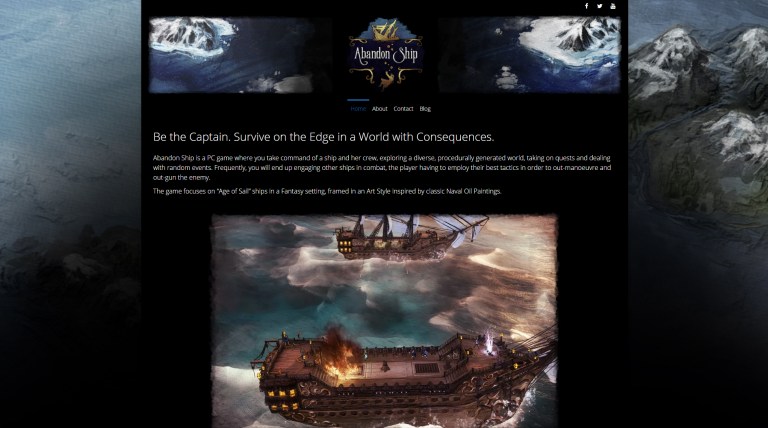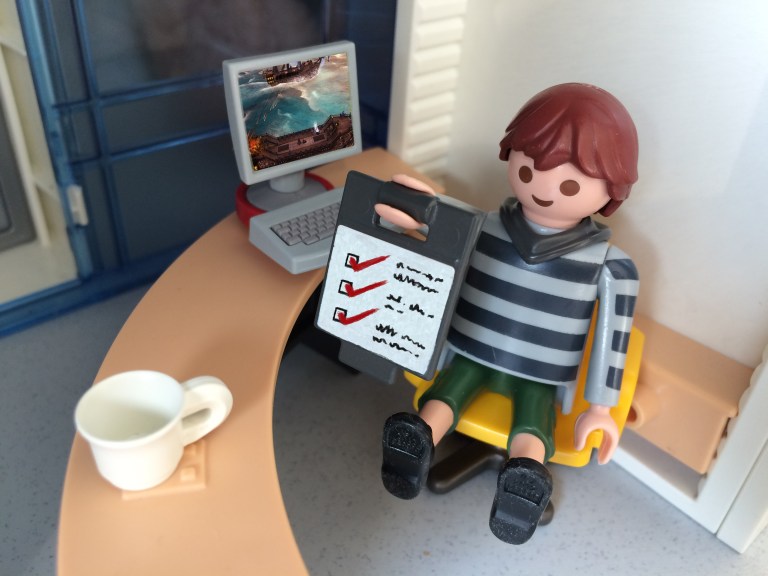This post by Gary Burchell originally appeared on the Abandon Ship game blog.
“From a ‘Proper Job’ to Indie” is a series of articles that describe what it was like going from Full Time employment into the world of Indie Development. Last time I described why I left a good job where I was happy and risked it all to go Indie. This time, I talk about what I did in that crucial opening period of Abandon Ship’s development. For people about to go Indie, this can be a useful checklist. For others, you can see how much non-game-making goes into making indie games!
So you have your awesome game idea and your watertight plan. You’ve left your job and the adventure is just beginning. Most people get as far as saying they’d love to do it, but you actually did it. Well done!
. . . Now What?
There are a lot of important housekeeping elements to attend to, and now is the time to do it. It might seem counter-intuitive to do something else other than focus on making the game, but it’ll only get busier later on, so do most of it now.
I was used to working in an established developer, so most of this stuff was either already sorted long ago, or there were people dedicated to taking care of it. Even though I knew I had to do it all, I still found it shocking just how much time it took up.
You’ll find there are businesses that offer to do a lot of this kind of setup for you, particularly with anything Company or Trademark related. Naturally this comes at a price, so save yourself the money. It may seem daunting at first, but it’s really simple.
I’ll give a summary on each task to keep it brief. There is a lot more information online.
In no particular order . . .

He’s smiling because he knows he recently did an off-site backup.
Set up Source Control
You’ve all heard the horror stories. Swathes of work lost from unexpected crashes and hardware failures. Don’t let this be you, so get some source control! At most start-up scales, there are free solutions. We use Perforce, which is free for up to five users. Perfect! Even if your personal PC is your server, make sure you perform offsite backups at least once a week.
Register the Company
Don’t spend too long thinking of a name if you don’t already have one. Unless you’re a team of superstar developer’s your first game will be the focus, not the company. Pick something you like, a name you’ll be happy with in years to come and go with it. For us (being based in the UK), we registered through Companies House. Make sure the company is a Limited one (Ltd in the UK or LLP/LLC in the US) for maximum protection.
As this will become a publicly available record, prepare to receive a lot of spam mail from other businesses offering you their services.

If it’s work-related driving, then you can log the mileage as an expense.
Start Tracking Your Expenses
Create an excel to keep a track of your business expenses, even from your personal account. It may not seem important now, but they’re all tax deductible. Keep your receipts in case you ever get audited. It’s unlikely, but better safe than sorry.
If you work from home, a portion of your utility bills can be claimed. Driven somewhere for a conference? Log the mileage!
Register Domain Names
If you have a game name that you plan to keep, register it as a domain name. It’s likely you won’t be able to have your first choice, so append the word “game” to it or similar.
While you’re at it, future-proof yourself and register the company domain at the same time, even if you just set up a redirect to the game site.
Register Any Trademarks
If you’re set on your game name, protect yourself by registering it as a Trademark. Start with the country you’re based in, and for most people that should be sufficient. In the UK, the Intellectual Property Office offers a good service to check there are no issues with your trademark application before you commit the full fee.
If you wish to go further, you can register individually on a country-by-country basis (warning; the USPTO can be daunting to apply to), or via services that handle regions such as the EU (EUIPO) or Worldwide (WIPO). Bear in mind there is a cost per territory, so it starts to build up quickly. The latter two services in particular can get expensive, so weigh up the pros and cons. At the minimum, register in the country you live in.
Finally, be prepared to receive lots of spam from companies claiming to assist you with your application. Be vigilant against these.

Accountants will be able to offer invaluable advice to a start-up.
Get an Accountant
The financial world is a very complicated one, so lighten some of the load by getting an Accountant. Preferably a Games Industry familiar one who will be able to advise you on R&D Credits and Games Tax Relief.
Get VAT Registered
I didn’t feel this was necessary during the initial phase, but at some point you’ll need to be VAT (Sales Tax) registered. If you plan to sell into any EU-based countries (you will) and are based in the UK, you’ll also need to be VAT MOSS registered.
When you register with Steam, you’ll need to fill out a W-8BEN form with your Unique Tax Reference Number (which if you’ve been following the steps so far, you’ll already have).
Steam is awesome in that it handles all Sales Tax and VAT per territory for each copy of your game sold. This takes a lot of busywork away from you, so when it’s time to file your returns, you only need to raise an Invoice for each payment you receive from Valve with the Steam report attached, and that is usually sufficient for the VAT-man (note – Valve don’t need the invoice, it’s for your purposes).

I’d never made a website before this one.
Set Up the Website
Even if you’re not familiar with building websites, there are enough free online resources and tutorials that mean you don’t need to pay anyone else to do it.
Once you’ve watched some tutorials, install WordPress (or similar), get some free Themes and build something simple yet functional and professional.
Make all your social media links prominent. Get a way for people to sign up to a newsletter. You want there to be a big circle where your social media links to the website and vice-versa.

Once you have a game Twitter account, make sure to pin your best Tweet to hook in people.
Set Up Social Media Accounts
Even if you’re not intending to use them right away, get a Twitter Account and Facebook Page set up for the game. Twitter tends to be the go-to social media platform of choice for Indie Devs, so make sure you take advantage of #screenshotsaturday and other Indie-Dev friendly hashtags.
Twitter and Facebook should be the minimum, but other social media could offer you potential avenues worth investigating. Be aware that users will pick up if you only use social media to promote your game, so if you’re going to use social media, make sure you engage with it. This is particularly true of Reddit.
I know it can be draining using yet another social media platform, so weigh up the time investment versus how much of a community you think you’ll get.
Claim Back Any Tax You’re Owed
In the UK, most people are paid through the PAYE system. The tax year ends on the 4th of April, so if you left your “proper job” before then (like I did at the end of November 2015) then you will probably be entitled to a tax rebate. Remember this, because it could be a nice little windfall (and is simple to do).
Phew! All of this and we haven’t even talked about making the game yet!
I know, right? Of course you should be ticking all this off while you’re developing, but knowing all of this in advance is really handy. Next time, we’ll talk about game related area’s to focus on when you’re starting out.

